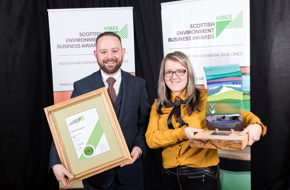Highlights
- Cutting waste – between 2006 and 2018, Paterson Arran has reduced the amount of general waste generated by 59%. This is despite production tonnage increasing by 87%.
- Water used to make each tonne of its product has been reduced by 63% between 2006 and 2018. Total water consumed has been reduced by 31% between 2006 and 2018.
- Absolute electricity consumption fell 10% between 2016 and 2018

Since it was established by husband and wife team John and Isabella Paterson in 1895, Paterson Arran has grown into one of Scotland’s best known independent food brands.
The company produces a wide range of shortbread, biscuits and oatcakes from its site in Livingston, including Britain’s number 1 shortbread brand, Paterson’s Shortbread.
Chutney, mustard and preserves are produced at the company’s Isle of Arran site and shipped across the globe. Since 2006, output has increased by more than 80% to meet growing demand.
Paterson Arran is committed to achieving sustainability across its business and has annual SMART targets for waste, water and energy.
Achievements include a near-60% reduction since 2014 in general waste, which is now used to generate electricity instead of going to landfill.
VIBES credentials
Paterson Arran won the Management SME VIBES Award in 2017.
Adam Wilson, Technical Manager at Paterson Arran Ltd, said:
“Winning the Management Award is a real testament to several years of hard work and commitment from everyone at Paterson Arran in developing our Environmental Management System and reducing our impact on the environment.”
“We are proud of our achievements and honoured to take our place amongst many other excellent companies who are working hard to deliver a sustainable future for Scotland."
Environmental and business benefits
- Cutting waste – between 2006 and 2018, Paterson Arran has reduced the amount of general waste generated by 59%. This is despite production tonnage increasing by 87%.
- Since 2014, the site has been landfill free. General waste is sent to an RDF (refuse-derived fuel) plant to make electricity. All the company’s food production waste is recycled as animal feed.
- Paterson Arran has reduced the energy used to make each tonne of its product by 42% between 2006 and 2018.
- Water used to make each tonne of its product has been reduced by 63% between 2006 and 2018. Total water consumed has been reduced by 31% between 2006 and 2018.
- Absolute electricity consumption fell 10% between 2016 and 2018
- The company’s recycling rate increased from 83% in 2008 to 94% in 2018
- Overall energy per tonne (gas + electricity) is down 42% since 2006
- The company has an Environmental Committee, which involves staff at all levels of the business. This has given different departments the opportunity to voice their ideas on environmental issues, and has helped communicate the company’s environmental message throughout the business.
- The Environmental Committee carries out monthly environmental audits of waste, water and energy use.
- Monthly audits are led by the HSE & Hygiene Officer and supported by a rotating member of the committee, in order to give each member exposure and training on how to complete an audit.
- The results of the audit are recorded and communicated via employee noticeboards on a monthly basis. Any anomalies are highlighted at meetings and monthly briefings.
Wider benefits
- Paterson Arran removed palm oil from its oatcake range in 2002 and a number of other products thereafter. The use of palm oil has a destructive impact on the rainforest and the habitat of the Orangutan. Paterson Arran is also a lifelong member of the Orangutan Foundation.
- Where used, palm oil comes exclusively from RSPO (Roundtable on Sustainable Palm Oil)
- The company has recently invested in and installed the ‘Stevens Traceability System’. Although it was originally installed for traceability reasons, they have expanded the software to include waste monitoring. This is being embedded throughout the site and generates data in order to analyse waste streams, trends and anomalies. The extent of this data helps to provide evidence regarding the investment of equipment.
- Paterson Arran works closely with its supply chain to identify potential improvements, including with its plastic film supplier and its sugar supplier.
- Each year, the company supports a wide range of charitable and community activities, recently raising over £100,000 for Macmillan Cancer Support through sales of Paterson's Shortbread.
- Last year the company installed it’s 2nd bee-hive on site. Each year all employees get a jar of ‘Paterson’s Blossom Honey.’
Website: www.paterson-arran.com